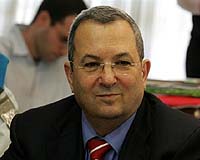| . |  |
. |
Washington (AFP) April 21, 2010 US President Barack Obama's administration has warned that "all options" are on the table if Syria supplied Scud missiles to Hezbollah but defended its pursuit of dialogue with Damascus. Israel believes that Syria has supplied Hezbollah with the ballistic missiles, which could dramatically increase the Lebanese Shiite militia's ability to attack the Jewish state. Jeffrey Feltman, the assistant secretary of state for the Middle East, said Wednesday the United States would have "really, really serious concern" if Syria had delivered such high-grade weapons to Hezbollah. "If these reports turn out to be true, we're going to have to review the full range of tools that are available for us in order to make Syria reverse what would be an incendiary, provocative action," Feltman said. "The United States has shown in the past that we are able to act," he told a congressional hearing. "I expect that all options are going to be on the table looking at this." But Feltman and other officials said they were still investigating the alleged Scud missile transfer. "We continue to study the matter," State Department spokesman Philip Crowley said. Senator Dianne Feinstein, who heads the Senate Intelligence Committee, told AFP Tuesday there was a "high likelihood" that Hezbollah had obtained Scuds. Israel launched punishing raids on Lebanon in 2006 in response to more than 4,000 attacks by Hezbollah with rockets that are less sophisticated than Scuds. The 34-day war killed 1,200 Lebanese, mostly civilians, and more than 160 Israelis, mainly soldiers. The Scud allegations come just as the United States steps up dialogue with Syria. President Barack Obama in February appointed the first US ambassador to Damascus in five years, Robert Ford, although the Senate has not yet confirmed him. Feltman defended the Obama administration's approach, saying: "We're not doing engagement because it's a pleasurable experience with the Syrians. We're doing engagement because it's in the US national interest." He said that many in the Arab world would not respond well to US envoys coming in for brief visits with negative messages. With an ambassador, the United States "can go in at a very high level on a regular, continual basis," Feltman said. "It enhances our ability to get our message across." But his position faced criticism on Capitol Hill, where some lawmakers are already upset by Obama's pressure on Israel's hawkish Prime Minister Benjamin Netanyahu over the peace process. Representative Eliot Engel, a member of Obama's Democratic Party, asked the president to reconsider sending an ambassador -- noting that shortly after the nomination, Syrian President Bashar al-Assad welcomed Iran's firebrand President Mahmoud Ahmadinejad. "It's almost like he's poking a finger once again in the eye of the United States," the New York lawmaker said. Engel joined Republican Representative Mark Kirk of Illinois in announcing they would introduce a resolution calling for tighter sanctions on Syria over the missile issue. Representative Dan Burton, a Republican from Indiana, said the United States should not "reward them when they're kicking us in the teeth or spitting in our eye." "I've talked to the Syrian ambassador here, and he seems like a nice guy and he's got a lovely wife, and I'd like to see us have a positive relationship with Syria," Burton said. "But I don't see how in the world we can take steps in that direction if this kind of crap's going on," he said. Hezbollah was the only group that did not disarm after Lebanon's 1975-1990 civil war. In Beirut, senior Christian politician Samir Geagea, who heads the Lebanese Forces, said that Hezbollah was controlling the country's defense policy and has "put Lebanon in danger." Syria has long played a dominant role in Lebanon but withdrew its last troops in 2005 after an outcry following the assassination of pro-Western former prime minister Rafiq Hariri. Feltman, a former US ambassador to Beirut, said he had "deeply felt feelings" for the "courageous Lebanese people." "The Lebanese should be in control of Lebanon," he said. "That's the message that we deliver to all the parties in the region but particularly Syria."
Share This Article With Planet Earth
Related Links
 Israeli defence minister seeks to calm war fears
Israeli defence minister seeks to calm war fearsJerusalem (AFP) April 19, 2010 Israeli defence minister Ehud Barak sought to calm fears of an impending new Middle East war, telling a radio interviewer Monday that Israel had no intentions of starting a fresh round of fighting. Speaking on army radio as Israel observed a day of remembrance for its war dead and victims of militant attacks, Barak was asked to respond to comments last week by Jordan's King Abdullah II, in w ... read more |
|
| The content herein, unless otherwise known to be public domain, are Copyright 1995-2010 - SpaceDaily. AFP and UPI Wire Stories are copyright Agence France-Presse and United Press International. ESA Portal Reports are copyright European Space Agency. All NASA sourced material is public domain. Additional copyrights may apply in whole or part to other bona fide parties. Advertising does not imply endorsement,agreement or approval of any opinions, statements or information provided by SpaceDaily on any Web page published or hosted by SpaceDaily. Privacy Statement |